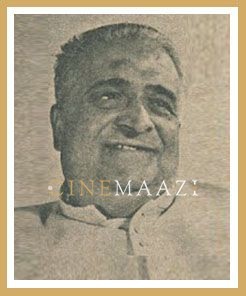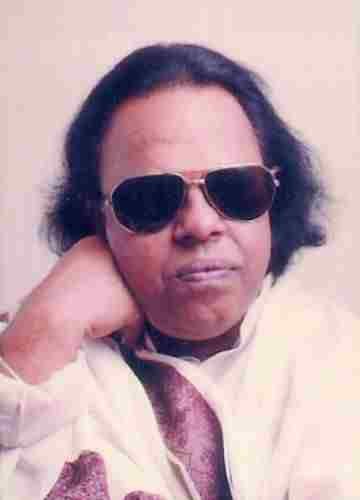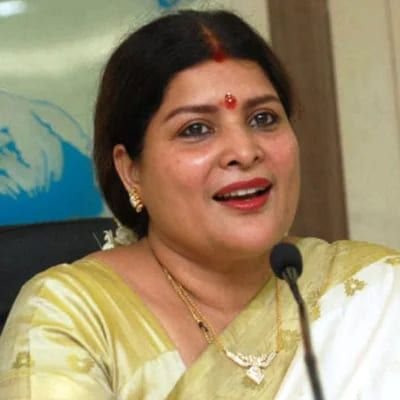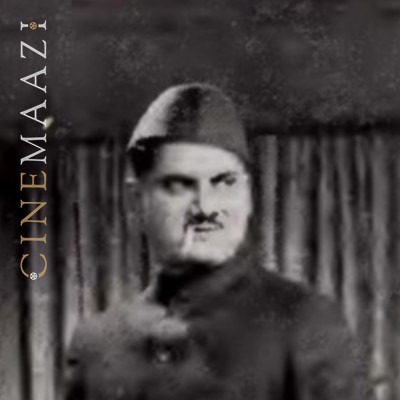G D Madgulkar

Subscribe to read full article
This section is for paid subscribers only. Our subscription is only $37/- for one full year.
You get unlimited access to all paid section and features on the website with this subscription.
Not ready for a full subscription?
You can access this article for $2 , and have it saved to your account for one year.
- Real Name: Gajanan Digambar Madgulkar
- Born: 1 October, 1919 (Madgule, Sangli district, Maharashtra)
- Died: 14 December, 1977
- Primary Cinema: Hindi
- Spouse: Vidya
- Children: Shridhar, Anand, Sharatkumar, Varsha, Kalpalata, Deepa, Shubhada
The multi-faceted Gajanan Digambar Madgulkar, better known as G D Madgulkar, was a poet, lyricist, author, playwright, actor and also magazine editor. He is known for penning the V Shantaram landmark films Do Ankhen Barah Haath (1957), Navrang (1959) and Goonj Uthi Shehnai (1959), among other films in Hindi and Marathi cinema. He penned approximately 157 screenplays and over 2000 songs in the course of his career. He also acted in films such as Adalat (1948), Pudheche Paool (1950), Jeet Kiskee (1952), and Jagachya Pathiwar (1960). GaDiMa, as he was popularly known by his initials in his home state of Maharashtra, also penned several novels, plays, poems and stories. He also contributed to India’s Independence movement and went on to later join politics. Honoured with the Sangeet Natak Akademi Award in 1951 and the Padma Shri in 1969, he was dubbed Adhunik Valmiki or the modern Valmiki, owning to his famous composition of Geet Ramayan or Ramayana in Songs, considered his most outstanding work.
Born on 1 October, 1919, his father was a clerk in Aundh state. His childhood was an impoverished one, with the family struggling with poverty. Schooling at the free school that the ruler Bhavanrao Pant Pratinidhi had set up for poor students, young Madgulkar had to leave his studies in standard 9, due to family issues. At the age of around 18 he headed to Kolhapur for work.
A portal into the world of films opened for him when his school teacher referred him to the writer-director Prahlad Keshav Atre who was also known as Acharya Atre. Atre, in turn, introduced him to prominent producer-director-actor Master Vinayak. In his early phase, Madgulkar acted in minor roles in Marathi films such as Brahmachari (1938) and Brandichi Batli (1939). Enduring the difficult days of sleeping outside a grocery shop and sleeping on an empty stomach on many nights, life took a turn for the better when he got the chance to pen the lyrics for a film. Pahila Palna (1942) was to be his debut as a lyricist. However, he first tasted real success came with V Shantaram's Lokshahir Ram Joshi (1947). He contributed considerably to the film, not just penning the songs and the screenplay, but also acting in the film. The film was a biopic of the poet Ram Joshi, starring Jayaram Shiledar and Hansa Wadkar. It became a huge success and resoundingly established Madgulkar in the industry.
He went on to pen several stories, screenplays and dialogues in the course of his career. His filmography includes approximately 157 Marathi films and 25 Hindi films, besides more than 2,000 Marathi songs. Besides the V Shantaram classics, he penned the screenplay for Jeevan Jyoti (1953), Toofan Aur Deeya (1956), among other films.
Madgulkar’s work is believed to have inspired a few classic Hindi films as well. While Guru Dutt’s Pyaasa (1957) and Sanjay Leela Bhansali’s Black (2005) apparently have their roots in stories originally penned by Madgulkar, the Rajesh Khanna-starrer Avtaar (1983) and the Amitabh-starrer Baghban (2003) are also said to be based on his popular film Oon Paus (1954).
Poems composed by Madgulkar have been adapted to several musical forms including Sugam-Sangeet (light music), Bhāwa-Geet (emotional songs), Bhakti-Geet (devotional songs), and Lāwani (a form of folk song-dance in Maharashtra). His collections of poems include Sugandhi Veena, Jogiya, Char Sangitika, Geet Ramayan, Kavykatha, Chaitraban, Geetgopal, Geetsaubhadra, Vaishakhi, Pooriya, Ajun Gagima, and Naach Re Mora. He also penned several collections of short stories such as Bandhavarchya Babhali and Krushnachi Karangali. Plays he penned include Aakashachi Phale and Parachakra, while he also wrote the novels De Tali Ga Ghe Tali, Mini, and Shashank Manjiri, among others. He also edited the monthly magazines Akshar and Dharti, and penned his autobiography Vatevarlya Savlya. Madgulkar was also an artist, with a fondness for painting scenes of nature.
Married to Vidya (née Patankar, from Kolhapur), the couple had seven children - Shridhar, Anand, Sharatkumar, Varsha, Kalpalata, Deepa, and Shubhada. Popular Marathi writer, Vyankatesh Madgulkar was G D Madgulkar’s younger brother.
G D Madgulkar passed away on 14 December, 1977 at the age of 58.
Madgulkar’s grandson, Sumitr Madgulkar launched his website gadima.com in 1998. It was the first multimedia website in Marathi literature dedicated to an author. Sumitr also launched CDs, DVDs and pen-drive versions of Madgulkar’s songs and literature, to carry forward his legacy.
Madgulkar’s home in Pune - Panchavati Bungalow – went on to become a place of attraction for his many fans.









.jpg)



